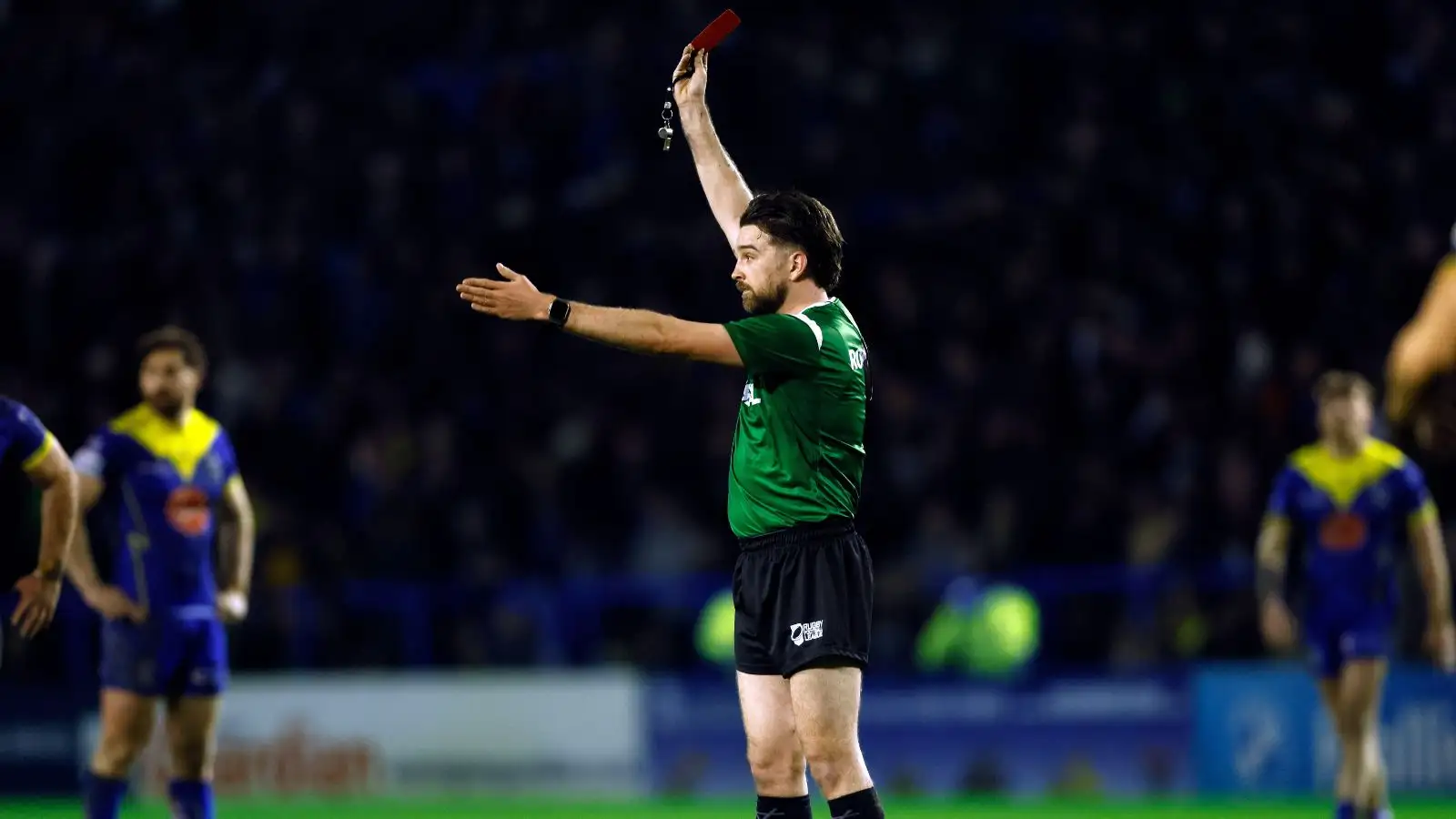RFL’s admission of guilt is vital moment in learning process for all with new rules

Referee Marcus Griffiths sends off Fa'amanu Brown in the first half of Hull FC's Round 2 defeat at Warrington Wolves
Whatever happens over the coming weeks, months and indeed years in regards to the swathe of law changes that are threatening to take over rugby league, there will be line in the sand moments where things change forever: either for better, or for worse.
Even the most optimistic supporter of the Rugby Football League would struggle to make a case for the early stages of the Super League season being positive from a disciplinary perspective. Of course, every year it feels like there is a bedding-in period for a controversial rule change; the madness surrounding obstruction rings a clear bell, for example. But this is different: this is a major set of changes to the fundamental way the game is played. You simply cannot out-coach or re-train years of muscle memory technique in one off-season.
Which is why there were always going to be bumps in the road. Huge ones, in fact. And in the past few days alone, we have had two line in the sand moments. The first was on Friday night, with Nu Brown’s inexplicable red card. There is really no other word to describe that moment – and while the outrage on social media can sometimes be a tad hyperbolic, in this instance it felt entirely on merit.
Tackles like the one Liam Watts was sent off for are specifically what the law changes are being brought in to prevent. They will be debated, of course they will, but in a nutshell, Watts’ red card probably was a red card in terms of the guidelines and the new framework.
LoveRugbyLeague.com recommends:
RFL to amend head contact framework after admitting ‘lack of clarity’
Super League Team of the Week: Hull KR trio, three players from Catalans Dragons
But accidental head contact? If you start sending players off for things like that, it is entirely rational to believe players will walk away, fans will switch off and in the end, you may well have no game. Dramatic? Perhaps. But realistic.
And that is why the second line in the sand moment, the events of Monday emanating out of the Rugby Football League, were just as significant on this journey the game is going on. It is fair to say everyone, not just Hull FC supporters, watched on with anticipation on Monday awaiting the results of Brown’s case with the match review panel. The two things the new law changes have lacked so far this year are communication to all stakeholders – most notably supporters – and on occasions, a clear need for common sense.
Both of those things finally arrived on Monday with not only the news that Brown wouldn’t be charged, but the RFL essentially admitting: we’ve got that one wrong. And for these changes to gain acceptance in the rugby league community, the RFL simply couldn’t bury its head in the sand and hope the furore surrounding moments like these would just go away. As mentioned, this isn’t the obstruction drama of a few years ago: this is something far more serious.

For the governing body to admit their framework lacked clarity around head contact is telling. It underlines how they have made a fundamental mistake and left on-field official Marcus Griffiths with absolutely nowhere to go on Friday night. The social media abuse directed at him wasn’t a good look. But most people understand that, as the RFL admitted, Griffiths and his team were put in an invidious position.
In some ways, plenty of good has come out of this. The framework has now been tightened up to ensure these kind of mistakes won’t happen again with accidental head contact and as a result, I firmly expect Leigh’s Tom Amone to have his ban quashed on Tuesday evening at a tribunal. For what it is worth, if the Brown error doesn’t happen on Friday, there weren’t actually anywhere near as many moments of drama and controversy in round two.
There will be other mistakes regarding other areas of the framework. And hopefully, the RFL have the decency to admit they have made a mistake again if that is the case. That level of honesty is the only way these changes will be palatable and even close to being accepted by players, coaches and supporters. They have to believe that their voices and concerns are being heard. That honesty simply has to continue.
Player power played a part too, and it should not be underestimated: nor should it be dismissed. They have the right to have more of a say in what is happening than arguably anyone else – they are, after all, the ones putting their body on the line. And hopefully, they can exact further changes and amendments to the laws if they are needed. But the reality is that those who have made this happen – the former players taking legal action – have ensured unless something truly incredible materialises, this is the way the game will be now.
Brown’s red card, however, was a horrendous mistake. It can’t – and shouldn’t be allowed to – happen again. But in the RFL admitting fault and showing they are open to discussing changes, it might just make what is happening on a wider scale become slightly more palatable.
NOW READ: Super League players to hold meeting with RFL in crucial week for law changes support